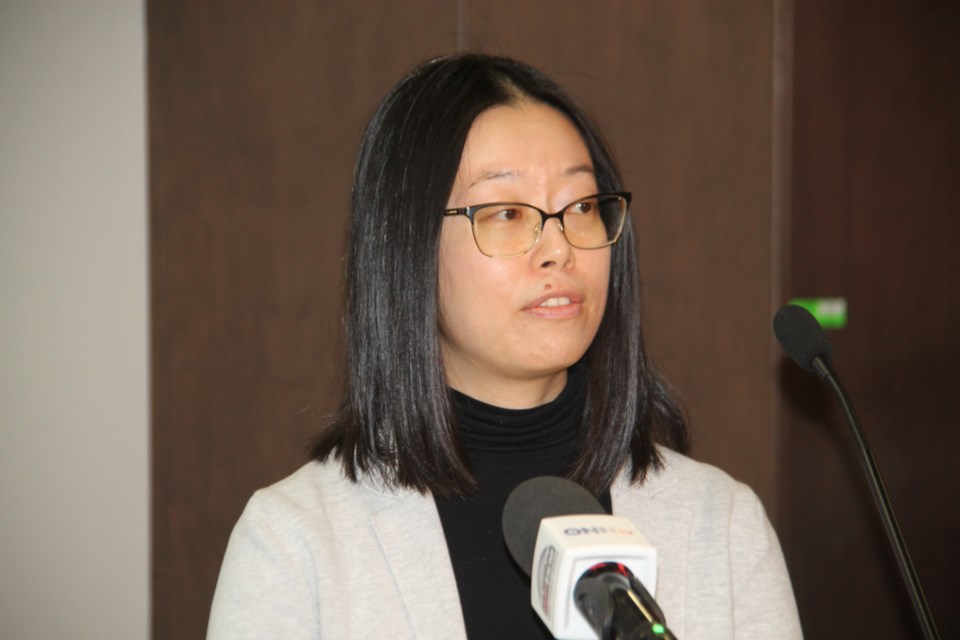Algoma’s medical officer of health says it will take at least two weeks to see if the measures put into place today will have an effect on a dramatic surge in cases for the area.
On Monday, Algoma Public Health held a video conference for media to address some of the questions people may have about the new restrictions announced last week and put into place today.
Dr. Jennifer Loo, medical officer of health for Algoma Public Health (APH), said the local seven-day average number of COVID-19 cases is 170 per 100,000. That is the highest number seen in the region so far during the pandemic by far.
“To give you some context, the last time that Ontario went into a state of emergency and shut down — where all schools and businesses were closed —happened when the provincial case levels were at around 130 cases per 100,000,” said Loo.
The number of cases in Algoma continue to spike, said Loo, while other areas like Sudbury have plateaued at about 120 cases per 100,000, and the overall Ontario average is fewer than 50 cases per 100,000.
It "climbed very high very quickly,” said Loo.
One key difference in this surge versus previous waves, said Loo, is the number of people in the community who are now immunized, versus the previous waves when no vaccine was yet available. Loo said about 75 per cent of the local population has received both shots of COVID-19 vaccine.
“With the protection of vaccines, we are still able to maintain a lot of critical functions in society and avoid the very disruptive and severe disruptions, like the closing of businesses and schools,” said Loo.
“But over 22,000 people in Algoma are not yet fully immunized and nearly 13,000 of our residents in Sault Ste. Mare — where rates of COVID remain among the highest in the province,” she said.
The mandatory interim measures put in place today are meant to target high-risk close contact activities and strengthen protections in all settings, without disrupting in-person learning or local businesses through broad closures.
Those measure include: restricting the number of attendees at social gatherings and organized public events to a maximum number of 10 people indoors and 25 people outdoors, strengthened masking and physical distancing requirements for businesses and organizations and prohibiting certain high risk close contact activities, among others.
“At the current rates of rise we still need to have additional protections in place so that we minimize the impacts to the people who are most vulnerable in our society — people who are elderly, have underlying medical conditions and people who are not yet immunized,” she added.
APH is being mindful of the approaching holidays by putting the new restrictions in place now to protect the most vulnerable in the community.
“There is so much transmission in our community right now, they are at increased risk and what we want to do is protect them as much as possible,” said Loo.
“I certainly hope over the coming weeks people will continue to take the precautions that we have advised, which is to stay home if you are ill even if you are vaccinated, to get vaccinated or get boosted if you are eligible at this time and most importantly to cut down on close contact unmasked activities,” said Loo.
Loo said contact tracing is showing that community spread is the key culprit for the rise in cases in Algoma and does not believe the recent reopening of the U.S. border to be playing a major role.
“We have absolutely seen increased traffic crossing the border when the borders reopened, but when we looked at cases
“Even though we always have a proportion of cases that are linked to international travel, that is not the majority of current cases at this present time,” said Loo. “The present amount of cases we are seeing at the present time is largely driven by community transmission and a lot of unprotected close contact activities.”
Loo said the current local spike is being driven by the Delta variant of COVID-19, not the newest Omicron variant that was recently detected in two cases in Ottawa. APH is doing heightened surveillance for the variant.
“At this time we haven’t seen Omicron in the Algoma positive cases,” said Loo. “We don’t yet know its severity relative to the other strains and we don’t yet know how effective our current vaccines are against this virus.”
“Time and time is needed for scientists around the world to better understand this virus,” said Loo. “What we know is we are able to detect it.”
Efforts are underway to offer booster shots of the COVID-19 vaccine to the following people who are eligible: those age 70 and up, health care workers and Indigenous people.
Those boosters are available to those categories 168 days after they received a second shot of the vaccine.
In addition, vaccines for children age five to 11 began rolling out locally late last week. Loo said so far hundreds of kids have received their first shot so far through APH and participating pharmacies.
While the Sudbury health unit is reinstating work-from-home requirements, Loo said that measure is not currently being considered for Algoma, although APH continues to assess the situation.
“It does take at least one to two weeks from the implementation of measures for us to see their benefit down the road, so we are only now seeing the potential effects of measures that were implemented two weeks ago,” she said.
Loo said public health orders for school and business closures are not currently in the plans, but APH is constantly assessing the situation.
“It’s our hope that with vaccination, with treatment, and additional protective measures that restrict the highest risk activities we can make it through this surge without the severe restrictions we saw in previous waves,” she said.
